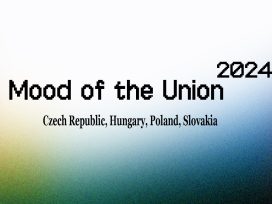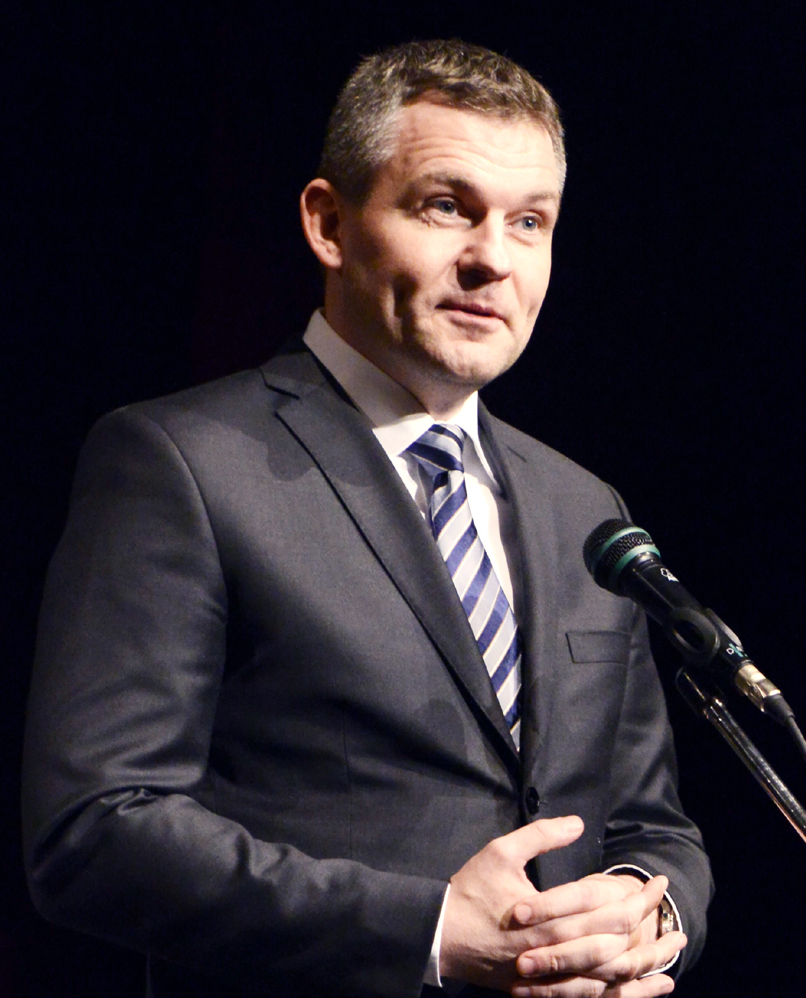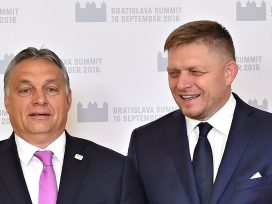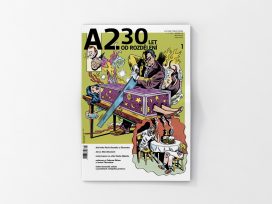The president retreated under pressure from Smer, the senior governing party, by agreeing to appoint its nominees as prime minister and interior minister. The organizers called off the most recent ‘For a Decent Slovakia’ protest in Bratislava’s central SNP Square – but not in other towns, and a silent march was organized by students in Bratislava. For the younger generation, this has been a month of accelerated history and instruction in politics, a subject which many of them had hitherto neglected. These were lessons in politics, but so strangely Slovak – with the great hopes of civic society marred by the cynicism of the powers that be! Where does Slovak society stand? Robert Fico and Robert Kaliňak – the former prime minister and interior minister, respectively – are gone, but their departure seems only for show. They won’t give up easily and without a struggle. Does Slovak society have the energy and stamina to proceed with this tragic-heroic struggle? Let us survey the field.
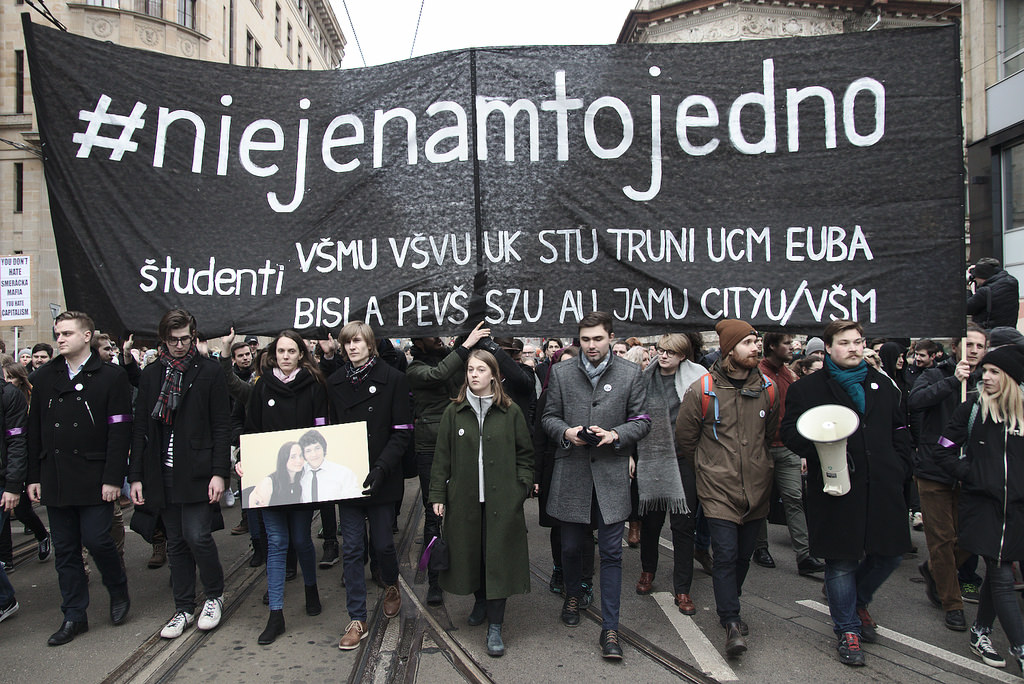
A silent protest by students in Bratislava on 23 March 2018. Photo: Peter Tkac. Source: Flickr
The president
The president’s actions are presented as deliberate and necessary decisions intended to prevent a constitutional crisis and not create a precedent. Andrej Kiska deserves credit for his actions during the crisis, but his steps in nominating a new government seem premature. He could have pushed for a list of ministers that meant the changes were real, not just cosmetic: not a single member of the ‘new’ government reflects change or responds to what people asked for in their hundreds of thousands in public squares across Slovakia. It is possible that the president, by his concession, has confirmed what he has been talking about for some time: that he will not stand for re-election next year. If he had insisted on substantive change or even early elections, he would have had to continue in office.
The interior minister
After the new government’s first candidate for interior minister (a former night club owner with no political track record) was rejected, the president demanded that, among other qualities, the interior minister needed to be someone who would pursue criminal proceedings against oligarchs and organized crime associated with political leaders. The leadership of Smer, however, interpreted this as a requirement for anyone who was not a party member – and concluded that if it cannot be a ‘friend’ of Robert Kaliňák, let it be someone who has no qualification for the position. The top candidate for the interior minister should instead be a man like former police chief Jaroslav Spišiak or lawyer Peter Vačok – both tested and honest investigators. When the new interior minister, Tomáš Drucker, as he says, ‘familiarizes himself with his new ministry,’ he will have the chance to appoint one of these men or someone of their calibre as the new head of the police. He will then be able to watch how a real investigation of political fraud and criminality should be conducted. It will not involve just a few Italians resident in Slovakia, but also those Slovaks who have stolen, deceived and murdered. Mr Drucker will need courage and a conscience: both are necessary not to remain a puppet in the hands of oligarchs, fraudsters and his predecessor. We keep our fingers crossed he that will find such courage – he wants to give the impression that he will.
Parliament
The main argument against presidential intervention in the appointment of government ministers is the claim that Slovakia is a parliamentary rather than a presidential democracy. However, interference with the choice of ministers is not interference with the executive power. It is necessary to repeat again and again that the current electoral system, in which Slovakia is a single, five-million-strong electoral district, produces MPs who are accountable only to their party leaders and not to any specific region. So all 150 MPs can vote in anonymity, ignoring the needs of voters. That is why 79 MPs agreed so quickly, and 81 subsequently voted for, the new government. These MPs do not have to consult voters because there is no defined group to whom they are accountable. They are in parliament because their position on the electoral list was decided by a party boss, not because they had to convince voters in their region of their moral character and professional abilities. This is why they have their offices around Bratislava Castle and not in their home districts. As a result, MPs, instead of acting according to their own consciences, as they are supposed to according to the constitution, vote as directed by their party bosses. This applies to all parties in parliament. If our parliamentary system is not reformed to create geographical constituencies we will not be able to count on the impartiality and independence of MPs, whatever is written in the constitution. Hence, Slovakia is a parliamentary democracy, but with a flaw, and thus there is no reason to venerate parliament vis-à-vis the president, who draws his legitimacy from being directly elected.
Murder and motives
In the case of Ján Kuciak and Martina Kušnírová, the first priority is to investigate the murders themselves and, second, to investigate the reasons why they happened. These are diametrically different investigations: the first is for investigators; the second is for politicians and law enforcement authorities. It should be stressed that the chance of finding the actual murderer(s) and those who directed them is minimal, irrespective of the skill and determination of our own or foreign investigators. The unresolved case of Daphne Caruana Galizia, the journalist murdered in Malta in October last year, is a reminder of this. Contract killers do not generally make mistakes; those that hire them can pay without leaving a trace. Only detectives can investigate: no one else should know the details, including members of our government who have repeatedly intervened in investigations in the past. Investigators need a free hand and a guarantee of zero political pressure. By contrast, and most importantly, the new government, headed by Peter Pellegrini, is responsible for investigating what Ján Kuciak and other journalists have written about: the mafia of the political environment. This is what society expects today from the new government and investigators, prosecutors and courts. There can be no blurred lines: it would mean freedom for thieves and murderers.
The new prime minister
The president, while naming the government, asked for the murder to be investigated but also insisted that the reasons for the murder be examined. So what did we hear from the new prime minister upon taking office? Peter Pellegrini declared that he and his government ‘will do everything in order for this act to be investigated and its perpetrators to be fairly punished.’ Not a word about the investigation of the causes. Not a word about those who inserted him into office, nor about those on his side who are suspected of having information about, or even having collaborated with, organized crime. For that matter, we might ask, why did former interior minister Robert Kaliňák and former premier Robert Fico actually resign? Neither Mr. Pellegrini, nor anyone in the new government, mentions this subject. ‘Calming the volatile situation’ is a very silly and inadequate reason for resignation. According to this inverted logic, Viliam Jasaň and Mária Trošková [former government advisers with nebulous roles, one of whom is a businessman and political fixer and the other a former topless model; they both stood down soon after the murders] can return to their posts. We deserve an explanation of why they were in their positions in the first place, why they left, and whether they are coming back or not.
The opposition
The only good news about the current opposition is that it played little role in the public protests, and cannot claim that it forced Fico and Kaliňák’s fall. The performance of the four opposition leaders comprised of populists, Eurosceptics and fascists shows that at this point in time early elections would be a disaster for Slovakia. Fico’s twelve years in power has generated political opponents who resemble him, albeit in cartoonish form. Over the next two years, new, honest politicians must emerge to reflect the events in the public squares, and who perceive politics not as a way of facilitating crime, but as a service to society and a means of repaying voters’ confidence in them. We also need politicians who will help create the moral environment that is so necessary for the upbringing and education of the young generation.
The young generation
The Slovak composer Egon Krák recently premiered his work ‘Message’ at the Slovak Philharmonic. In a commentary he wrote: ‘We admire the wisdom and genius of the giants of science and arts, and at the same time marvel at the unprecedented rise of narrow-mindedness and idiocy. The world races ahead with shocking discoveries that enrich our lives, but also astounds us with its poverty and backwardness. ”
So welcome, young generation, to this Janus-faced world where politics has not been so radicalized since the Second World War. You have overcome fear and kept the high moral ground. Remember though, your continuous struggle is the path to a decent Slovakia for your generation. We have experienced normalization [the period of communist retrenchment in the 1970s following the Soviet invasion and occupation of Czechoslovakia in 1968] as well as Mečiarism [a period of quasi-authoritarianism under Prime Minister Vladimír Mečiar in the 1990s] – both inflicted much suffering but eventually collapsed. We hope and believe that, with the unprecedented energy of civil society and young protest organizers, the Fico era will be shorter than either of the two. Beware of the backlash as the media oligarchs and mafia allies in political circles try to convince us that Fico’s rule is what we need again and that his Slovakia is a ‘success story’. Together with fascists and Russian trolls they will spread conspiracy theories and fake news, about how we are being sacrificed to foreign values, to Soros, to gays and to western liberalism. This battle is not just being fought in Slovakia – witness Russia and the United States – but with the world at a crossroads, Slovakia is suddenly in the forefront of the struggle for the future of democracy.
We are alone
If this month brought something new, it was the emergence or awakening of a third ‘apolitical-political’ power in society. In addition to the ruling coalition and the opposition, this is a strong civil society, a brave young generation and independent media. There have been times when civil society seemed inactive, as it did in the long era of Robert Fico’s governments. The recent massive protests seemed to reawaken a dormant energy and the people who turned out are no longer willing to accept hollow promises or to be afraid of politicians’ threats. That gives us real hope after thirty dramatic days that shook Slovakia. A return to the status quo ante, before the murders of Ján Kuciak and Martina Kušnírová, is impossible. Yet what direction Slovakia picks next is not clear at all. The Visegrad Group, the United States, and even the EU will no longer provide a support for liberal democracy as they did in the past. We’re on our own. This makes the future unpredictable, but for the decent people of Slovakia, their commitment and stamina will be that much more binding and meaningful.
A version of this text was originally published, in Slovak, in the Slovak daily Denník N on 29 March, 2018.
